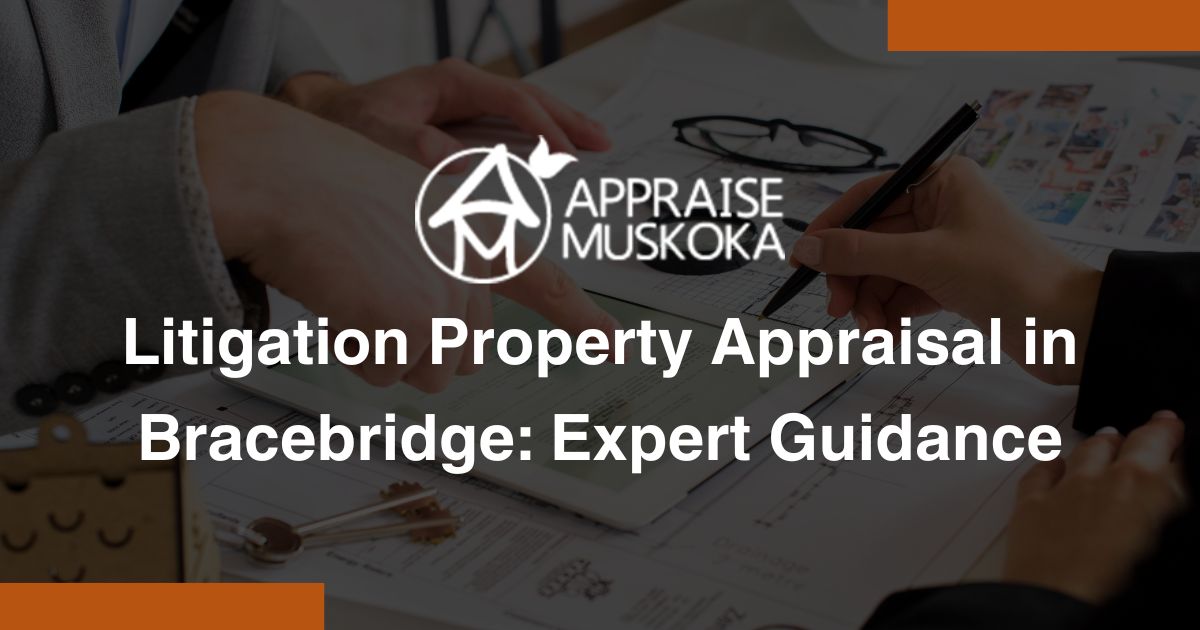
Litigation Property Appraisal in Bracebridge: Why You Need an Expert
In property-related legal disputes, whether they arise from divorce, estate settlements, or commercial conflicts, accurate property valuations play a crucial role in determining a fair outcome. A professional litigation property appraisal provides an impartial, reliable value assessment that can be used in legal proceedings. If you’re involved in such a dispute in Bracebridge or Port Carling, obtaining the right property appraisal is vital to protecting your interests.
A litigation property appraisal is distinct from a standard real estate appraisal. These appraisals are carried out with legal scrutiny in mind, meaning they require a higher level of precision and documentation. In these situations, the appraiser could even have to testify in court. Whether you’re facing a dispute over property division, taxation, or business assets, understanding how a litigation property appraisal works—and why it matters—is essential.

What is a Litigation Property Appraisal?
A litigation property appraisal is a specialized form of property evaluation performed for legal cases. Unlike regular market appraisals, which are primarily used for buying, selling, or refinancing, litigation appraisals are focused on supporting legal claims. They provide an unbiased, fact-based estimate of a property’s value, which is vital for ensuring that all parties involved receive a fair and accurate assessment.
The situations where a litigation property appraisal might be needed are varied. These include divorce proceedings, estate settlements, condemnation cases, tax disputes, or even business dissolutions. The appraisal needs to be more extensive and precise than a normal appraisal because these matters concern the law. It must adhere to strict legal standards and often involves additional paperwork, such as supporting evidence or testimony in court.
In Bracebridge and surrounding areas like Port Carling, where real estate values can fluctuate based on location, market conditions, and other factors, hiring an expert in litigation property appraisals ensures you have a solid foundation for any legal proceedings.
Why Do You Need a Litigation Property Appraisal in Bracebridge?
Property-related legal disputes can become highly contentious, especially when emotions or financial stakes are involved. Whether it’s a divorce, a family inheritance dispute, or a commercial property division, obtaining an accurate valuation is essential for reaching a fair resolution. Here’s why you should consider a litigation property appraisal:
1. Impartial Valuation for Legal Proceedings
In legal disputes, especially cases like divorce or estate divisions, tensions can run high, and both parties may have conflicting views on property values. A litigation property appraisal offers a third-party, unbiased assessment, which is critical to avoiding disputes over fairness. With no personal or financial interest in the outcome, the appraiser provides an objective view of the property’s worth, based on current market conditions, property condition, and other relevant factors.
The value provided by the appraiser is accepted by courts as a reliable assessment. This impartiality is particularly important in Bracebridge, where real estate markets can be competitive, and an unbiased, professional opinion can help mitigate any potential conflicts.
2. Appraisal Reports Designed for Court Use
A regular real estate appraisal might provide useful information for a buyer or seller, but it may not hold up in court. Litigation property appraisals, however, are designed to meet stringent legal requirements. In many cases, these appraisals are scrutinized by opposing legal teams, and judges or juries may base their decisions on the information provided.
In Bracebridge, litigation appraisers are familiar with these requirements and ensure that their reports are accurate, detailed, and fully compliant with legal standards. These reports include detailed documentation of how the property value was calculated, with supporting evidence such as comparable sales data, market research, and property condition assessments.
3. Handling Complex Legal Issues with Confidence
Property disputes often involve complex factors such as zoning laws, property damage, or historical sales data. These cases require more than just a simple look at the property’s location and size. Litigation property appraisers dig deep into the details, considering everything from market conditions to legal regulations that may affect the property’s value.
For example, a property in Port Carling might be subject to different zoning restrictions than one in downtown Bracebridge, which could significantly impact its value. An expert appraiser will have the knowledge and resources to navigate these complexities and provide an accurate, defensible appraisal.
4. Testifying as an Expert Witness
In some cases, a litigation property appraiser may be called upon to testify in court. This is especially common in high-stakes cases involving large estates or commercial properties. In these situations, the appraiser must be able to clearly explain their findings in a way that both legal professionals and laypeople can understand.
Appraisers with courtroom experience in Bracebridge and Port Carling are familiar with the legal process and know how to present their findings convincingly. They are skilled in defending their valuation under cross-examination, which can be crucial to the success of your case.
5. Accuracy Is Essential for a Fair Resolution
One of the most important reasons to hire a litigation property appraiser is accuracy. In legal disputes, even a small error in property valuation can have major consequences. If the value is underestimated, one party may lose out on what they are rightfully owed. If it is overestimated, another party could be unfairly burdened with financial obligations.
A professional litigation appraiser ensures that every detail is carefully examined to provide an accurate valuation, backed by solid evidence. This level of accuracy helps all parties involved achieve a fair resolution, whether the case involves a single-family home or a multi-million-dollar commercial property.
Litigation Property Appraisal in Port Carling
Just as in Bracebridge, property disputes in Port Carling often require litigation property appraisals. Port Carling, known for its stunning waterfront properties, can present unique challenges for appraisers due to the high value of real estate and the specific market conditions in the area. If you’re involved in a legal dispute over a property in Port Carling, it’s essential to work with an appraiser who understands these local nuances.
Waterfront properties, for instance, often carry a premium due to their location, but they may also come with specific legal and environmental considerations that affect their value. A litigation property appraiser familiar with the Port Carling market can provide a fair and accurate valuation that takes these factors into account.

The Litigation Property Appraisal Process: What to Expect
If you’re facing a property-related legal dispute, it’s helpful to know what to expect from the appraisal process. Here’s a step-by-step overview of how a litigation property appraisal typically works:
- Initial Consultation
The first step is a consultation with the appraiser, where they will gather information about the property and the nature of the legal case. This is your opportunity to explain any relevant details, such as the reason for the dispute and the outcome you’re hoping to achieve.
- Property Inspection
Next, the appraiser will visit the property to conduct a thorough inspection. They will assess factors such as the property’s size, condition, and location. Depending on the case, they may also take note of any unique features that could affect the value, such as waterfront access or recent renovations.
- Research and Analysis
After the site visit, the appraiser will conduct extensive research to support their valuation. This research may include reviewing comparable property sales, zoning regulations, and market trends. The appraiser will also analyze any relevant documents, such as property deeds or tax records.
- Appraisal Report
Once the research is complete, the appraiser will compile their findings into a detailed report. This report will include the appraiser’s final valuation, along with supporting evidence such as market data and property photographs. The report is designed to be clear and comprehensive, ensuring that it can withstand legal scrutiny.
- Court Testimony (If Needed)
If the case goes to trial, the appraiser may be called to testify. In this role, the appraiser will explain their findings to the court and may be asked to defend their valuation under cross-examination. An experienced litigation appraiser will be well-prepared to handle this aspect of the case.

How to Choose the Right Litigation Appraiser
Choosing the right appraiser can make a significant difference in the outcome of your case. Here are some tips to help you select a qualified litigation property appraiser:
Experience in Litigation Cases: Not all appraisers have experience with litigation, so it’s important to find someone who understands the legal requirements and complexities involved.
Licensed and Certified: Verify that the appraiser is licensed and certified to practice in Ontario. This ensures that they meet industry standards and have the necessary qualifications.
Local Knowledge: Choose an appraiser who is familiar with the real estate markets in Bracebridge and Port Carling. Local expertise is crucial for providing an accurate valuation.
Courtroom Experience: If your case could go to trial, look for an appraiser with experience testifying in court. This can give you an advantage when presenting your case.
Conclusion
When faced with a property dispute in Bracebridge or Port Carling, a litigation property appraisal can provide the impartial, court-ready valuation you need to protect your interests. By hiring an experienced appraiser, you can be confident that your property will be evaluated fairly and accurately, ensuring a just outcome for all parties involved.
Frequently Asked Questions (FAQs)
A litigation property appraisal is a professional evaluation of a property’s value, designed specifically for use in legal disputes, such as divorce, estate settlements, or tax disputes.
Litigation property appraisals are more detailed and must meet legal standards. They often require additional research and documentation, and the appraiser may need to testify in court.
You will need a litigation property appraisal if you’re involved in a legal dispute that involves real estate, such as a divorce, estate settlement, or tax dispute.
The timeline can vary depending on the complexity of the case, but it typically takes a few weeks to complete. More complex cases may take longer.
Yes, many litigation property appraisers are experienced in testifying in court and defending their valuation under cross-examination.